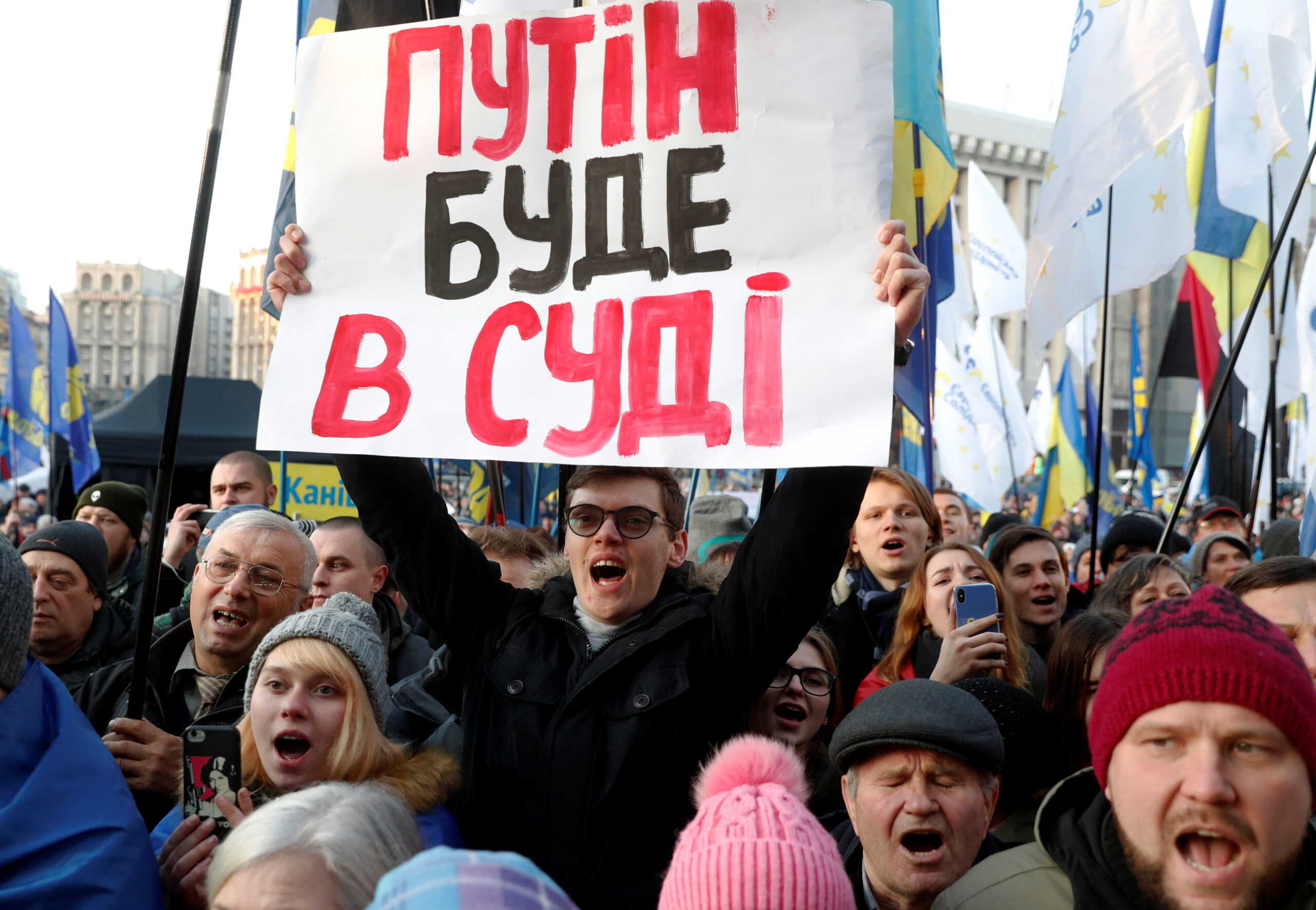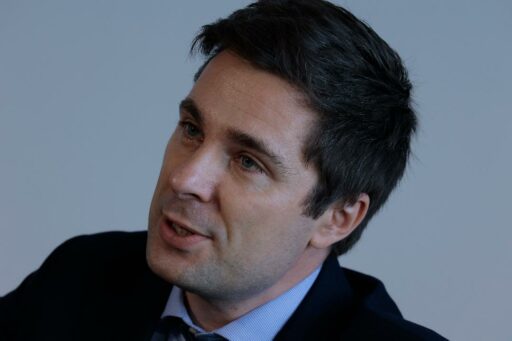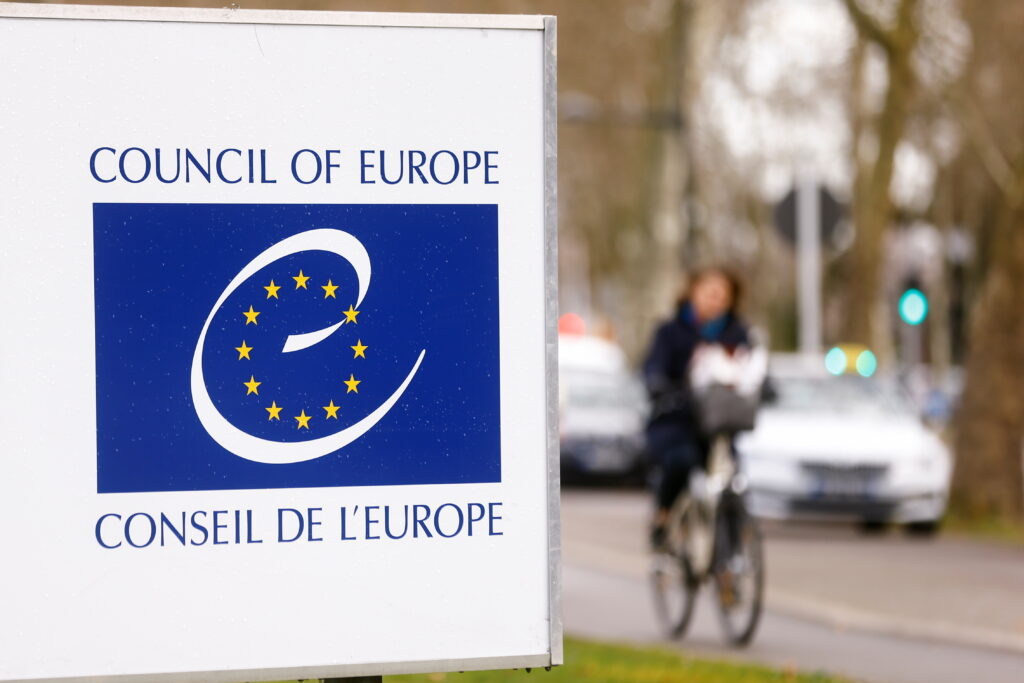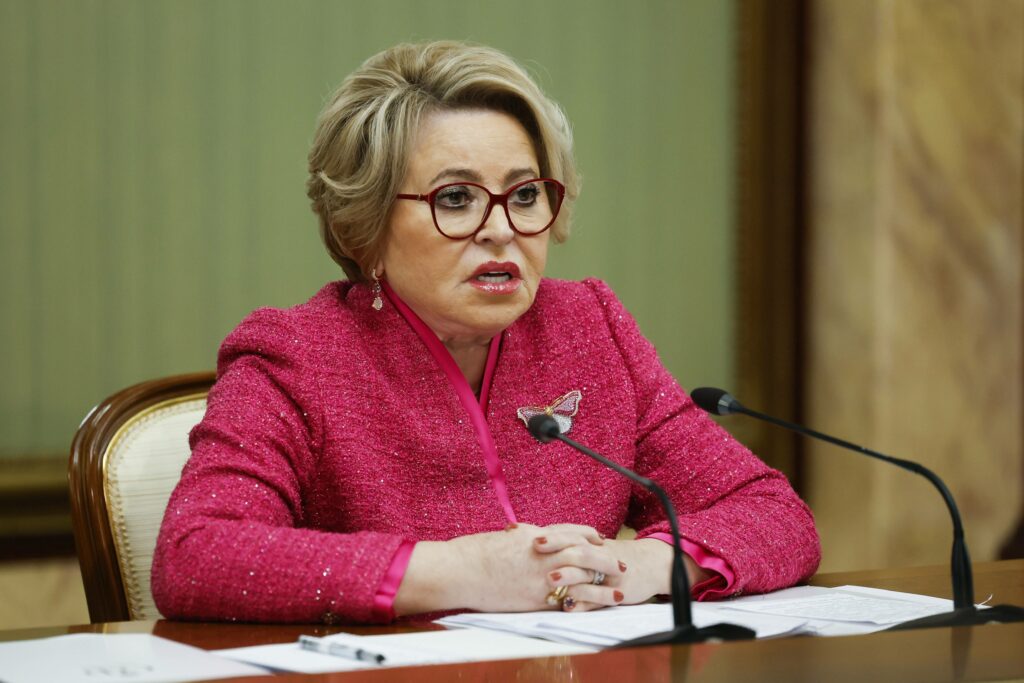The establishment of a special tribunal for the crime of aggression against Ukraine has entered a decisive phase. Officials of the Council of Europe and the European Union announced that the group of states supporting the tribunal initiative (the so-called Core Group, comprising 41 states in total) has made a principal decision to move forward with creating the special tribunal. According to the Secretary General of the Council of Europe, «a coalition of states has reached agreement on key issues, and the Council of Europe is ready for the next steps—to negotiate the text of an agreement on the tribunal and to hold a diplomatic conference on its adoption.» These statements, symbolically made on the eve of the third anniversary of the full-scale invasion and the eleventh anniversary of Russia’s aggression against Ukraine, promise the creation of the tribunal by the end of this year.
«Accumulated Evil of the Whole»
The war of aggression unleashed by Putin’s Russia has led to hundreds of thousands of deaths, both military and civilian, the destruction of Ukrainian cities, enterprises, transport and energy infrastructure, and grave consequences for the natural environment. The Russian side has perpetrated numerous war crimes and crimes against humanity. But the war itself is criminal, and only one legal concept fully describes all these disasters—the crime of aggression.
The judgment of the Nuremberg International Military Tribunal, which convicted Nazi leaders of «crimes against peace» in 1946, noted: «War is essentially an evil thing. Its consequences are not confined to the belligerent States alone, but affect the whole world. To initiate a war of aggression, therefore, is not only an international crime; it is the supreme international crime differing only from other war crimes in that it contains within itself the accumulated evil of the whole.» Russia’s aggression against Ukraine is not only the most apparent textbook example of the crime of aggression under international law but also a vivid illustration of its truly devastating nature. The resolution of the Parliamentary Assembly of the Council of Europe, adopted in January 2023, stated that «without their [Russian and Belarusian leaders] decision to wage this war of aggression against Ukraine, the atrocities that flow from it (war crimes, crimes against humanity and possible genocide), as well as all the destruction, death and damage resulting from the war, including from lawful acts of war, would not have occurred. As the United Nations Human Rights Committee has stated, States engaged in acts of aggression as defined in international law, resulting in deprivation of life, violate ipso facto the right to life guaranteed by Article 6 of the International Covenant on Civil and Political Rights.»
Indeed, the vast majority of incidents of damage to persons, property, and the environment in Ukraine cannot be considered war crimes or crimes against humanity—for instance, the death of Ukrainian military personnel as a result of legitimate strikes against military targets, which include the combatants themselves, the death of civilians that may be «collateral damage» from attacks on military facilities, and the consequences for the environment. Despite the apparent centrality of the crime of aggression, there is currently no mechanism for the individual criminal responsibility of the leaders of Russia and Belarus for this crime.
The International Criminal Court has been able to exercise jurisdiction over the crime of aggression since 2018. However, the price of this compromise was a jurisdictional mechanism that required minimum participation of both the aggressor and the victim states in the Rome Statute. The only exception to this rule is the referral of the case by decision of the UN Security Council, which essentially limits the ICC’s capabilities to situations like a hypothetical Liechtenstein aggression against Austria. There is hope for a change, as amendments to the statute will be discussed in 2025 at the Second Review Conference. However, in any case, this is unlikely to affect Russia’s aggression against Ukraine.
Although possible in principle, national proceedings on the crime of aggression, including before the courts of the state victim of aggression, are fraught with significant legal and practical difficulties. In addition, they will not be perceived as impartial. A full-fledged process on the crime of aggression will likely be possible both in Ukraine and Russia or in a third state. The most realistic way to justice is an international tribunal.
Special Tribunal
The tribunal initiative was born in the first days after the start of full-scale aggression, when a group of well-known lawyers and politicians put forward a proposal that many states, including Ukraine itself, supported. So far, the tribunal, which has not been created, has been widely discussed among diplomats and academic circles. Two approaches to the creation of the tribunal quickly emerged.
The first group, which included Ukraine itself and its European allies (primarily the states of Eastern Europe and the Baltic states), firmly insists on the «international» format of the tribunal. The most natural way to establish a tribunal from the point of view of international law—by a UN Security Council resolution—is firmly blocked by Russia’s veto power. Supporters of the «international» model proposed to use the scheme under which the Special Court for Sierra Leone was established at one time—a treaty between the UN and Ukraine with the support of the General Assembly. This idea was not supported due to fears that the states of the «Global South» might oppose such a resolution, and no discussion took place on the UN platform.
The second group consisted of supporters of a «hybrid» or «internationalised» tribunal. This idea came primarily from the United States and other G7 states. They see the tribunal as «rooted» in the Ukrainian legal system, with (rather vaguely worded) «international support.» While formally supporting the idea of the tribunal, supporters of the «hybrid model» advocated maintaining the status quo, confirming the impossibility of launching an international court for the crime of aggression.
Ukraine rejected the idea of a «hybrid tribunal» on both formal and substantive grounds. The final compromise was the decision to establish the tribunal within the framework of the Council of Europe by concluding an agreement between the organisation and Ukraine, with the possibility of accession of other states. The decision on this matter was made in April 2024 by the CoE Committee of Ministers. And only now, three years after the start of a full-scale war, is the tribunal initiative beginning to take actual shape.
Immunity as a Point of Contention
The draft agreement on the future tribunal (its statute) is neither public nor final. To date, only some details are known.
First, the location of the tribunal is clear. The Dutch government has proposed hosting it in The Hague, the unofficial capital of international justice. The International Court of Justice, the International Criminal Court, the Specialist Chambers for Kosovo, the EU Criminal Justice Agency (Eurojust), and many other international institutions are located here, as well as the International Centre for the Prosecution of the Crime of Aggression against Ukraine and the Council of Europe’s register of damage caused by Russia’s aggression.
Secondly, the tribunal will be «as international as possible.» Its creation will be based on an international treaty rooted in international law. In particular, it would rely on the definition of the crime of aggression enshrined in the Rome Statute, which limits those responsible to «persons in a position effectively to exercise control over or to direct the political or military action of a State.»
The head of state, the head of government, the minister of foreign affairs (the so-called «troika»), and, under certain conditions, other persons have personal immunity before the jurisdiction of other states. They are also potential defendants in the crime of aggression (which in international law is a «leadership crime»). International judicial practice has developed a position on the non-applicability of immunities in international courts, which are not organs of states but act in the interests of the international community. The Rome Statute of the ICC includes a provision for non-application of immunities, and the Court has already issued arrest warrants against incumbent state officials, such as Vladimir Putin and Benjamin Netanyahu. However, the status and parameters of this rule are controversial. A number of states, primarily the United States and France, do not want to create a precedent where states, even if they gather in large numbers, can «lift» the immunities of third states.
One of the possible solutions to this problem, proposed in the report prepared in the Parliamentary Assembly, is to leave the issue of the application of immunities to the judges of the future tribunal if the accused is brought before them. This option also allows the tribunal to assess the legitimacy of Putin and Lukashenko, who have been usurping power in Russia and Belarus for more than a quarter of a century. According to the Parliamentary Assembly of the Council of Europe, both dictators cannot be regarded as legitimate heads of state.
Another less preferable option is to follow the principle that the trial of former leaders is possible only after they leave office, when the question of immunity is lifted by itself (this is what happened in all cases of the trials of the leaders of states: Milosevic, Kambanda, Taylor, Gbagbo, and others). And the German and Japanese «major war criminals» no longer held any positions when they were tried in Nuremberg and Tokyo. Despite the certain rationality of this decision, it is impossible not to notice that it actually encourages dictators to retain power for life and legitimises their impunity, including before international justice.
Another controversial issue to be resolved is whether the tribunal can conduct trials in absentia. The inaccessibility of Russian leaders to justice is one of the essential arguments of critics of the idea of a tribunal as such. Since the trial of Martin Bormann in Nuremberg (where a dead man was sentenced to hanging), trials in absentia for international crimes have aroused restrained feelings. The only international trial of those accused of terrorism in the Special Tribunal for Lebanon turned out to be a failure. The trial of Girkin and others responsible for the attack on MH17 in the Netherlands also caused mixed assessments. In the ICC, a trial in absentia is not possible.
At the same time, all activities related to the investigation and confirmation of charges can be carried out in absentia. This will make it possible to assess the available evidence and achieve a public effect. This year, for the first time in the history of the ICC, the procedure for confirming the charges in the case of the infamous leader of the Ugandan rebel group «Lord’s Resistance Army,» Joseph Kony, will be held in absentia. It will also be important that the defendants have the opportunity to present their arguments. Another issue is that they are unlikely to use it.
«Tribunal for Putin»?
The term «tribunal for Putin» is widely used in the media. EU High Representative for Foreign Affairs and Security Policy Kaja Kallas also said that «there is no doubt that Putin has committed the crime of aggression, that is, an attack on another country.» Such statements, especially by senior officials, are unfortunate, to put it mildly.
Of course, Putin is and must be (as follows from his numerous statements and actions) the primary person investigated and criminally prosecuted for the crime of aggression, but from the point of view of criminal justice, such pre-conviction even discredits the tribunal that has not yet been created. Its purpose is not to punish those who have already been appointed guilty (this is how, by the way, the Soviet representatives in Nuremberg saw justice) but to establish the truth and determine responsibility.
Under international law, responsibility for the crime of aggression is borne by a relatively small circle of persons (according to the Rome Statute, these are «persons directing or exercising control over the political or military actions of a state»). Still, it is not limited to the head of state or even the «troika.» Criminal responsibility for complicity in aggression is also possible, but much will depend on what wording the states choose in the end.
The Special Tribunal and Russia
The advantages of creating the Special Tribunal are obvious both for Ukraine and for the entire international community. This blatant act of Russia’s aggression must receive a legal response. Future aggressors, regardless of their nuclear status or the right of veto in the UN Security Council, must be aware of the legal consequences of their actions.
A special tribunal, if established, would be able to give a voice to the victims of aggression. In addition, the tribunal, as an international court competent to establish the fact of aggression, will be essential in resolving the issue of reparations and, in general, Russia’s responsibility for the war. In addition, the special tribunal is the only real opportunity to give a legal assessment of the actions of Belarus as an accomplice to the aggression and to determine the responsibility of its leadership.
The Special Tribunal will be no less critical for Russia and Russian society than for Ukraine and the international community. This mechanism will allow the judicial process to study the specifics of decision-making on aggression and help determine the Russian dictatorial regime’s essence and individuals’ role in its formation. Furthermore, the tribunal and its findings will be essential for international and national trials on the crimes committed in the war in Ukraine.
Establishing individual guilt in a fair trial will allow for an honest and verified historical record of the conflict. This is fundamentally important for the reconciliation process with Ukraine. Justice and individual responsibility make it possible to escape the «collective guilt» narratives that inevitably became widespread in the war context.
For Russia, it is essential to break the «chain of impunity» of the power holders for crimes against other countries and peoples, as well as against Russians. According to the authors of the Brussels Declaration of Russian lawyers and human rights activists who supported the creation of the Special Tribunal, «this war became possible because the grave crimes committed in the past by the leadership and military of Russia on their own soil and abroad remained unpunished.»
A special tribunal alone cannot return Russia to democracy and peaceful life. Nevertheless, the responsibility of the initiators of the war and those who committed war crimes and crimes against humanity will protect Russian democracy from the danger of a recurrence of authoritarianism. It will help to overcome manifestations of imperialism and militarism in Russian society.
Is the Tribunal an Obstacle to Peace?
While welcoming the progress towards establishing the Special Tribunal, one cannot but note a significant delay in the process. If created, the tribunal will begin its work in entirely different conditions. There is no longer a broad consensus in the spring of 2022. The main factor today («the elephant in the room») is the new American administration, which does not see international criminal justice as worthy of support. And on the ICC issue, the Trump administration is actually on the same front not only with Israel but also with Putin’s Russia.
Alain Berset, Secretary General of the Council of Europe and former President of Switzerland, said that it is extremely difficult to predict the initiative’s fate regarding relations with the new American administration: «we must move as quickly as possible in a very uncertain context.» «It is clear to everyone that without the support of the G7, the tribunal will not fly.»
It is debatable how sincere Donald Trump and his administration are in seeking peace in Ukraine. Still, justice and accountability for violations of international law are not part of the package of peace proposals. Moreover, the danger of the «deal» lies, among other things, in the political legitimisation of aggression and the normalisation of territorial seizures—the primary «mortal sin» of contemporary international law.
Indeed, efforts related to justice are often seen as an obstacle to the peaceful resolution of conflicts or a hindrance to peace negotiations. But there can be no sustainable peace without justice and accountability. If impunity prevails, any pause in hostilities will only be a respite before a new aggression.










